November 9, 2022
Veggie treats and cultural pride at Fiesta Verde ’22
By Joy Rojas
Advocating vegetarianism and raising funds for Tzu Chi’s various programs weren’t the only objectives met by Fiesta Verde ’22, a bazaar organized by Tzu Chi volunteers on November 5 and 6 at the Buddhist Tzu Chi Campus in Sta. Mesa, Manila.
In line with Tzu Chi’s eco-friendly practices, the event had shoppers paying for their purchases with debit cards amounting to P1,000, P2,000, and P5,000. The value of the cards could also be converted to plastic chips in P10, P20, P50, and P100 denominations.
“There’s a lot of waste in using paper and we tried to eliminate that. This was the first time we used the digital way of payment,” explained Tzu Chi Deputy CEO and OIC Woon Ng. “It might not have been perfect, but if we don’t get a head start, when will we? It was very experimental but it was also an important step. Everybody learned.”
Fiesta Verde ’22 also introduced shoppers to a wide variety of food and product sellers with a similar mindset as Tzu Chi. “A lot of the exhibitors were with our previous Fiesta Verdes,” said the OIC of the 61 participating sellers. “But we also went around the Sunday Markets, sought out the vegan and vegetarian exhibitors, and invited them to join us. I also went online to find exhibitors who share in our advocacies.”
The result: a vibrant mix of merchants who made vegetarianism fun, accessible, and palatable.
One of the busiest stalls at Fiesta Verde ’22 was Vutcher, which brands itself as a plant-based carinderia (Filipino eatery). Founded in 2018 by Ross Rowalle, Vutcher sold vegan sisig, bopis, and dinuguan rice meals, an assortment of sweet and savory empanada, and other foods that appeal to Pinoy taste buds. No eggs or dairy went into the making of these treats; instead, the likes of soy from Taiwan and local veggies were used.
“Our goal at Vutcher is to introduce familiar-tasting food to Filipinos who are having a hard time transitioning to vegan,” said owner Ross Rowalle. A vegan since 2011 (“I don’t like that animals are being killed for food,” he said), Ross remembers making do with limited options like vegetables and tofu for his meals.
These days, choosing to go meat-free has never been easier, thanks to Ross and options like Vutcher. “A lot of people are learning about my brand,” he says. “I’m happy that they think our food is delicious.”
For millennials and Generation Z, going vegan came by way of Kopicha, the snack station that sells milk tea, coffee, and various potato products (French fries, hash browns, wedges). “Our offering for Fiesta Verde was to make our drinks vegan,” said proprietor Sharmaine Tan. “For our milk tea, we had a choice of vegan creamers, and we could make your milk tea or coffee soy milk-based.”
Commercially available vegetarian ingredients were also on hand for home cooks to whip up meatless meals at home. While Quorn, Veg Fuzion, Omni, and other brands sold tasty plant-based meat alternatives, premier food service solution provider Global Pacific had an array of products to complement veggie dishes. “Global Pacific is the distributor of Arla cheeses and dairy products, Beryl’s chocolate, and food items and ingredients from Sunny Farms, Aviko, and Yamamori,” said brand representative Jones Castro. “Most of our products are imported and we also carry local brands like DLA, which offers fruit fillings for those who bake at home.”
When they weren’t filling their bags with food, shoppers were snapping up products that promoted Filipino culture. At Tzu Chi Bicol’s booth, bags handwoven from karagumoy (Pandanus simplex) went fast, even before exhibitors finished setting up their display. Rustic floor mats and area rugs made of durable abaca, and an assortment of pili nuts, a trademark of Bicol, also caught buyers’ eyes.
“We really chose our best products, and we went as far as Bulusan, Sorsogon City, Legaspi, Camalig, and Tabaco to source them,” said Tzu Chi volunteer and Bicol native Therese Tan. “All our products are from nature, and the handwoven ones were made by housewives who can hand-weave a bag in six hours.”
Proud as well of her Cordillera roots, Sagada-born Wryneth Mayapit showcased her people’s culture and craftsmanship in two initiatives. As the first and only social enterprise sock brand, INDI Heritage Socks PH partners with indigenous weavers from the Cordillera. “They make the weave designs and we use machines to apply these weave designs into our socks made of 100% cotton,” explained INDI co-founder Wryneth.
Close consultations with the weavers are a must, as some weave designs are considered sacred and thus inappropriate to wear on the feet. Those that do make the cut provide pops of color as well as Filipino identity into one’s attire. INDI’s collaboration has yielded 18 sock designs by the Tingguians of Abra and seven from Ifugao weavers. The brand also carries Philippine icon designs like carabao, pawikan (sea turtle), and jeepney patterns on its socks.
A second program taps a community of women senior citizens from Sagada that make boxes, bags, coasters, and other handicrafts out of recycled paper. Trained beforehand, these seniors collectively known as Salibi Likha have received custom orders for their wares through Wryneth’s participation in Fiesta Verde ’22.
Both incentives bring more than livelihood opportunities to two underserved groups. For INDI Heritage Socks PH, applying ancient weave patterns into modern apparel can inspire indigenous youth “to be part of their revitalizing culture,” said Wryneth. As for Salibi Likha, therapy and strong community ties are among the results of regular gatherings to upcycle discarded paper into useful crafts. “By purchasing our products, you also help senior citizens be productive and self-sufficient in their golden years.”
Fiesta Verde ’22 is one of the events leading up to Tzu Chi Philippines’ 28th anniversary celebration on November 13, 2022.
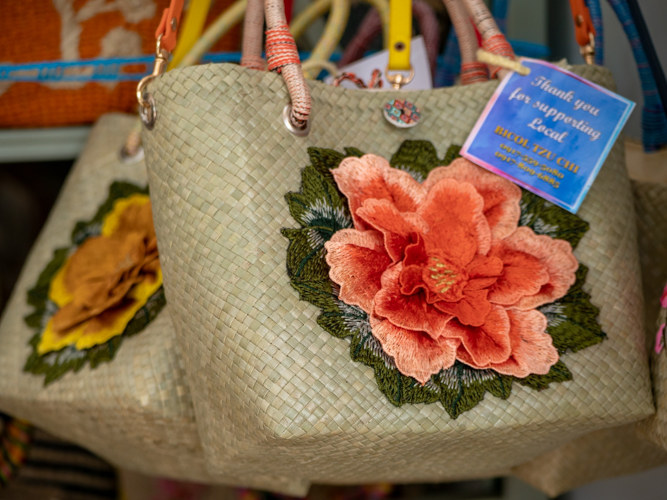 Bags handwoven from karagumoy (Pandanus simplex) were a hit at the Tzu Chi Bicol booth. 【Photo by Daniel Lazar】
Bags handwoven from karagumoy (Pandanus simplex) were a hit at the Tzu Chi Bicol booth. 【Photo by Daniel Lazar】
 Handicrafts from Bulusan, Sorsogon City, Legaspi, Camalig, and Tabaco as well as treats like otap and pili nut were sold at the Tzu Chi Bicol booth. 【Photo by Daniel Lazar】
Handicrafts from Bulusan, Sorsogon City, Legaspi, Camalig, and Tabaco as well as treats like otap and pili nut were sold at the Tzu Chi Bicol booth. 【Photo by Daniel Lazar】
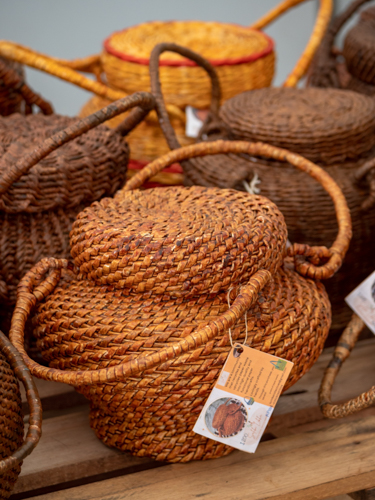 They look like they’re made of wicker or wood, but these baskets are made of recycled paper by Sagada’s women senior citizens. 【Photo by Daniel Lazar】
They look like they’re made of wicker or wood, but these baskets are made of recycled paper by Sagada’s women senior citizens. 【Photo by Daniel Lazar】
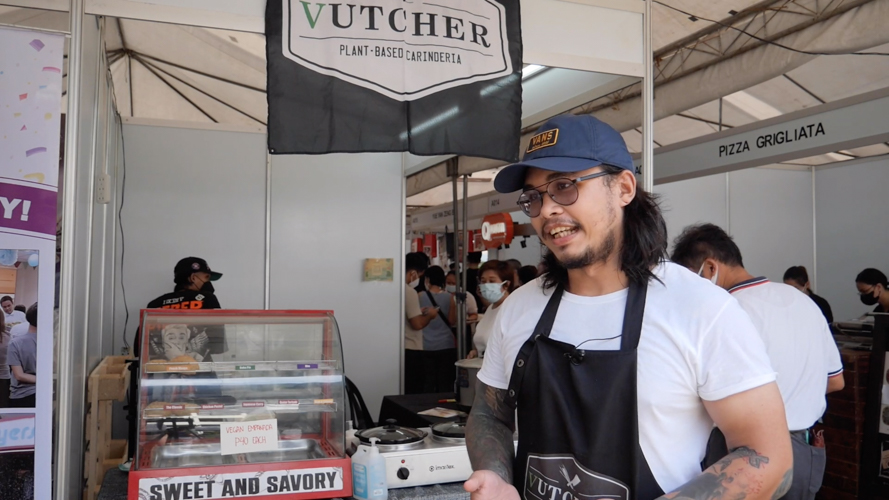 “Our goal at Vutcher is to introduce familiar-tasting food to Filipinos who are having a hard time transitioning to vegan,” says Ross Rowalle, founder of plant-based carinderia (Filipino eatery) Vutcher. 【Photo by Harold Alzaga】
“Our goal at Vutcher is to introduce familiar-tasting food to Filipinos who are having a hard time transitioning to vegan,” says Ross Rowalle, founder of plant-based carinderia (Filipino eatery) Vutcher. 【Photo by Harold Alzaga】
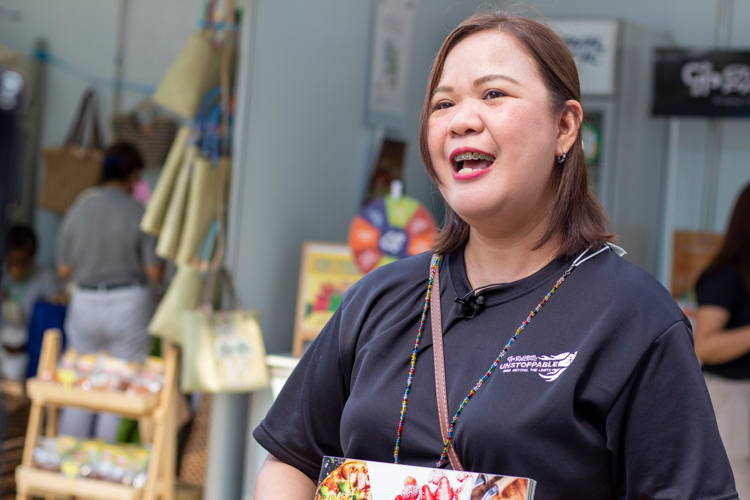 Jones Castro represents Global Pacific, the premier food service solution provider of brands like Arla, Beryl’s, Sunny Farms, Aviko, and Yamamori. 【Photo by Matt Serrano】
Jones Castro represents Global Pacific, the premier food service solution provider of brands like Arla, Beryl’s, Sunny Farms, Aviko, and Yamamori. 【Photo by Matt Serrano】
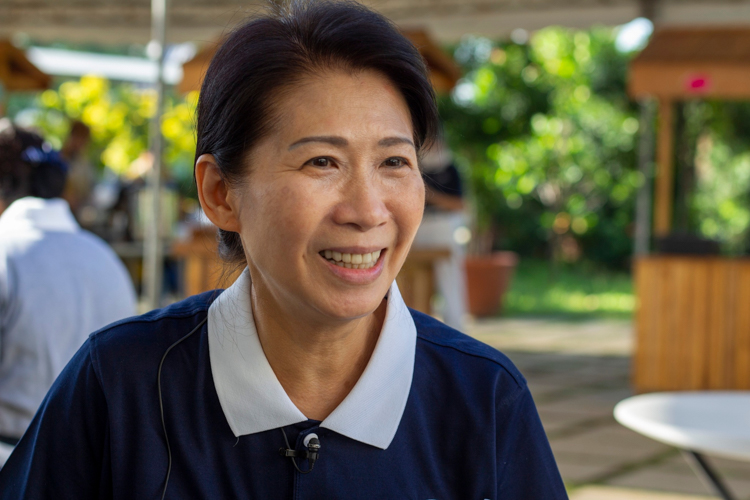 To come up with Fiesta Verde’s 61 sellers, “we went around the Sunday Markets, sought out the vegan and vegetarian exhibitors, and invited them to join us. I also went online to find exhibitors who share in our advocacies,” says Tzu Chi Deputy CEO and OIC Woon Ng. 【Photo by Matt Serrano】
To come up with Fiesta Verde’s 61 sellers, “we went around the Sunday Markets, sought out the vegan and vegetarian exhibitors, and invited them to join us. I also went online to find exhibitors who share in our advocacies,” says Tzu Chi Deputy CEO and OIC Woon Ng. 【Photo by Matt Serrano】
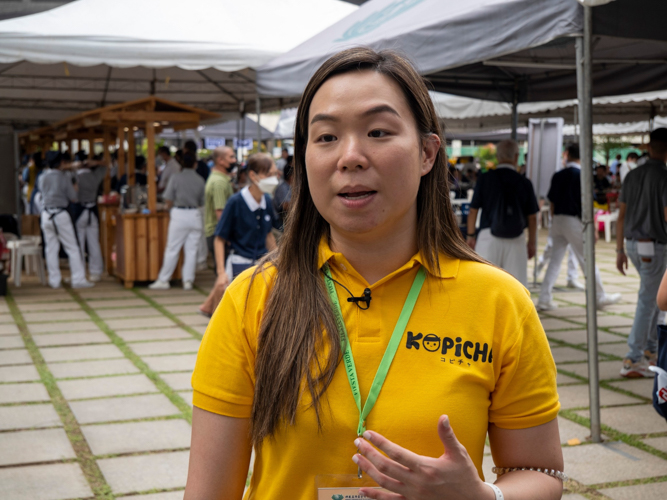 At Kopicha, buyers can request for soy milk and vegan creamers on their coffee and milk tea, says Sharmaine Tan. 【Photo by Matt Serrano】
At Kopicha, buyers can request for soy milk and vegan creamers on their coffee and milk tea, says Sharmaine Tan. 【Photo by Matt Serrano】
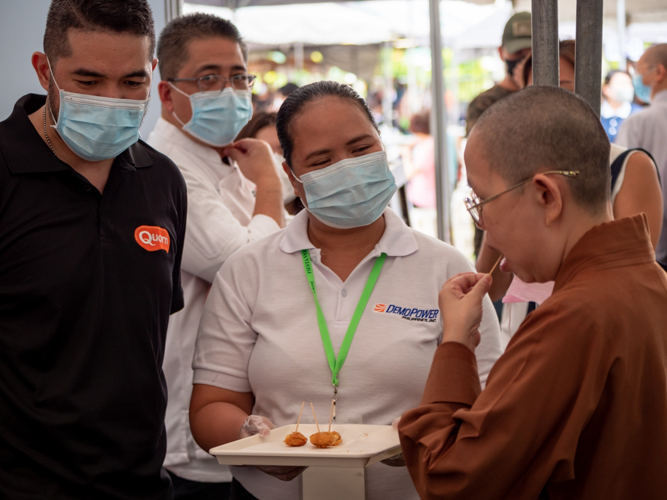 A Buddhist monk samples a serving of Quorn, a brand of plant-based meat made of Mycoprotein. 【Photo by Daniel Lazar】
A Buddhist monk samples a serving of Quorn, a brand of plant-based meat made of Mycoprotein. 【Photo by Daniel Lazar】
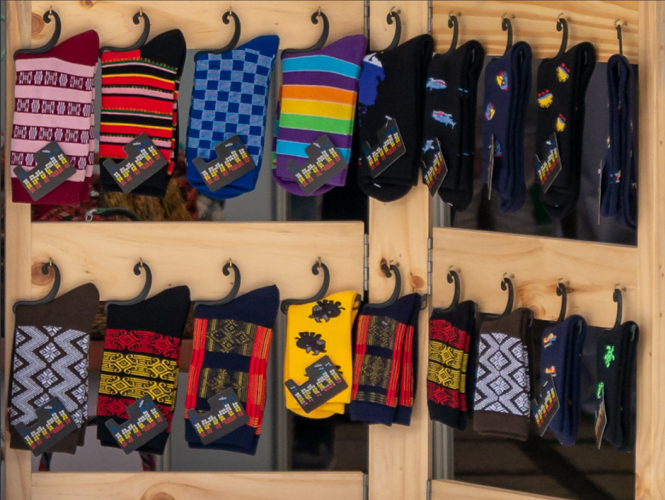 INDI Heritage Socks collaborates with the Tingguians of Abra and Ifugao weavers to create distinctly Filipino designs for their 100 percent cotton socks. 【Photo by Daniel Lazar】
INDI Heritage Socks collaborates with the Tingguians of Abra and Ifugao weavers to create distinctly Filipino designs for their 100 percent cotton socks. 【Photo by Daniel Lazar】
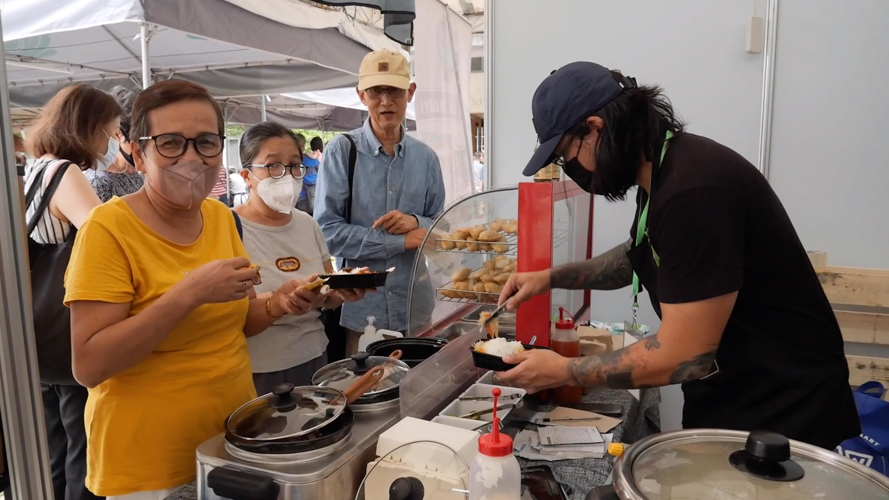 Customers can’t get enough of Vutcher’s vegan versions of bopis, dinuguan, and sisig. 【Photo by Harold Alzaga】
Customers can’t get enough of Vutcher’s vegan versions of bopis, dinuguan, and sisig. 【Photo by Harold Alzaga】
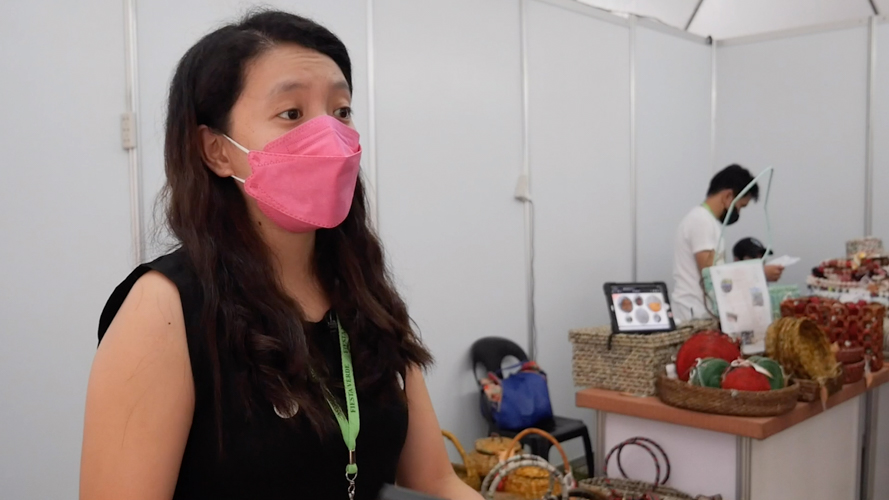 Besides giving underserved communities from Cordillera livelihood opportunities, Sagada-born Wryneth Mayapit celebrates Cordillera culture and craftsmanship through INDI Heritage Socks PH and Salibi Likha.【Photo by Jeaneal Dando】
Besides giving underserved communities from Cordillera livelihood opportunities, Sagada-born Wryneth Mayapit celebrates Cordillera culture and craftsmanship through INDI Heritage Socks PH and Salibi Likha.【Photo by Jeaneal Dando】
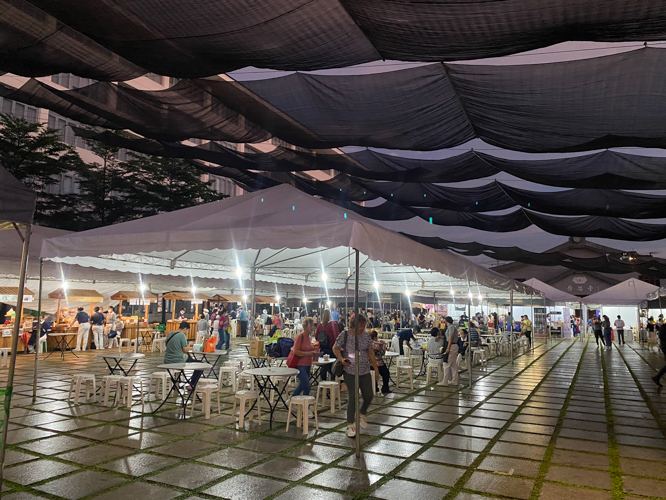 Fiesta Verde ’22 took on a night market look when it rained late in the afternoon on the first day. 【Photo by Matt Serrano】
Fiesta Verde ’22 took on a night market look when it rained late in the afternoon on the first day. 【Photo by Matt Serrano】
 Tzu Chi CEO Henry Yuñez is flanked by Sharmaine Tan (left) and Therese Tan (right) at the Kopicha booth.
Tzu Chi CEO Henry Yuñez is flanked by Sharmaine Tan (left) and Therese Tan (right) at the Kopicha booth.
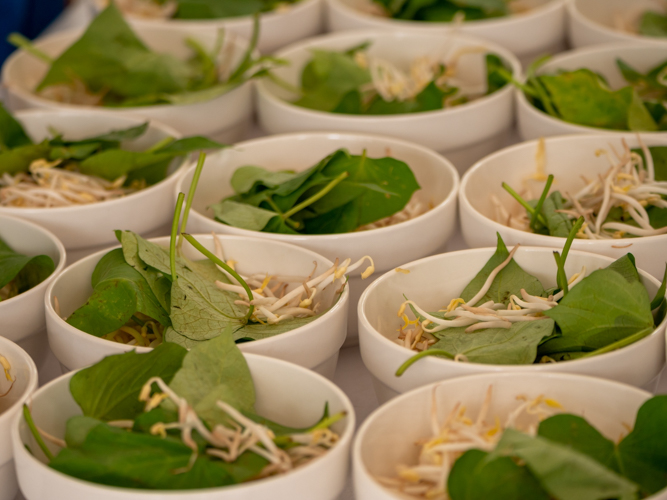 Dan-dan noodles 【Photo by Daniel Lazar】
Dan-dan noodles 【Photo by Daniel Lazar】
 Takoyummy, a vegetarian version of the Japanese snack Takoyaki. 【Photo by Daniel Lazar】
Takoyummy, a vegetarian version of the Japanese snack Takoyaki. 【Photo by Daniel Lazar】
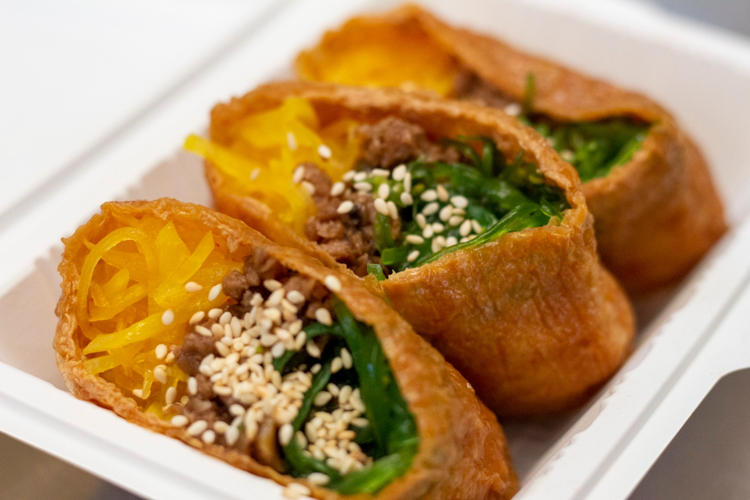 Tofu sushi 【Photo by Matt Serrano】
Tofu sushi 【Photo by Matt Serrano】





